
Image Source: FreeImages
Introduction: The significance of preserving gaming history
As a passionate gamer, I have always been fascinated by the rich and diverse history of video games. From the early days of simple pixelated graphics to the immersive and realistic experiences we enjoy today, the evolution of games is a testament to the creativity and innovation of game developers. However, as technology advances and new games are released, it is crucial that we do not forget the importance of preserving gaming history. In this article, I will discuss why archiving and documenting the evolution of games is so important and the impact it has on the industry.
Why is archiving and documenting important?
Retaining and chronicling the progression of games is essential for various motives. Primarily, it permits us to value the origins of the industry and the pioneering efforts who established the groundwork for contemporary gaming. By safeguarding early consoles, game cartridges, and other artifacts, we are able to achieve a more profound comprehension of how gaming has evolved through the years.
Furthermore, safeguarding and recording gaming history guarantees that forthcoming generations can gain wisdom from previous times. Comparable to any other structure of craft or diversion, computer games are a fundamental piece of our way of life. By keeping up game improvement materials, early forms, and social artifacts, we can give important experiences into the social, innovative, and innovative angles of changing eras in gaming.
In closing, safekeeping and recording gaming’s chronicles assist us in establishing a feeling of individuality and legacy inside the gaming local area. It permits us to praise the accomplishments of game makers and recognize the effect that games have had available to us. By shielding gaming history, we are shielding a piece of ourselves and the encounters that have molded us.
The evolution of games: From early consoles to modern gaming
The progression of games has proven a captivating path encompassing numerous decades. It all commenced with the humble origins of the arcade period in the 1970s, where diversions like Pong and Space Invaders enthralled the globe. These preliminary diversions highlighted unpretentious designs and gameplay, yet they positioned the groundwork for what was to follow.
During the 1980s, home video game consoles catalyzed a transformation within the gaming industry. Products such as the Atari 2600 and Nintendo Entertainment System enabled millions of families to experience interactive entertainment right in their living rooms. These systems debuted memorable characters for the ages including Mario and Zelda who later featured in immersive adventures with compelling storylines. The consoles from this era helped establish the foundation for the deeply engaging video games enjoyed by many in the present day.
Through continued technological progress, the gaming industry evolved as well. During the 1990s, 3D graphics emerged and classic series such as Doom, Super Mario 64, and Final Fantasy VII were established. These titles pushed limits on what could be achieved, ultimately setting higher benchmarks for immersive narratives and gameplay experiences. They demonstrated new potentials for drawing players into vivid worlds and engaging interactions.
In the early 2000s, online gaming became mainstream with the introduction of consoles like the PlayStation 2 and Xbox, which enabled players to connect and compete with each other over the internet. This marked a new era in gaming, where multiplayer experiences and online communities became an integral part of the gaming landscape.
Today, we are in the age of virtual reality and augmented reality, where players can step into the game world and interact with it in ways we could only dream of before. Games like The Legend of Zelda: Breath of the Wild and The Last of Us Part II continue to push the boundaries of storytelling, graphics, and gameplay, captivating players around the world.
Challenges in preserving gaming history
Ensuring gaming history remains accessible presents unique obstacles. Perhaps the greatest hurdle stems from technology’s relentless progress. With each new console or gaming platform arrives, preceding hardware and software become outdated. This obsolescence complicates efforts to engage with and experience older titles, particularly those tailored for definite devices. Maintaining function across shifting formats takes persistent preservation.
A consideration is safeguarding computer games in a digital format. Dissimilar to physical duplicates, electronic diversions can without much of a stretch get lost or wind up impervious with more current equipment and working frameworks. This positions a huge hazard to protecting the recorded past of computer games, as numerous more seasoned titles are just accessible electronically.
When considering game development, the decentralized nature presents difficulties for safeguarding and chronicling gaming’s story. Unlike other mediums like movies or books that usually involve fewer creators, game creation demands teamwork across multiple individuals and companies. This collaborative approach complicates efforts to retrace and conserve the evolutionary process, incorporating early experimental versions, design records, and other relevant resources. Properly archiving such a widespread creative effort poses noteworthy challenges.
While facing difficulties, ongoing attempts look to safeguard gaming’s past and overcome hindrances. Crucial contributions come from museums, libraries, and digital venues in archiving and chronicling games, making certain later generations can engage with and gain from gaming’s wealth of history.
Strategies for archiving and documenting games
In order to adequately safeguard gaming history, multiple tactics may be instituted. One method involves establishing tangible archives containing game consoles, cartridges, and other relics. These material repositories enable scholars and aficionados to engage with and examine the games in their authentic manifestations, yielding valuable understandings into the innovative process and societal influences of disparate games.
A further approach involves the digitization of video game media. Converting physical copies of games into digital form safeguards their preservation and availability for generations to come. This method also assists in resolving the problem of outdated hardware and software, as digital copies can be experienced on contemporary technologies and platforms.
Proper identification and organization are crucial for preserving gaming heritage. By identifying games with applicable metadata like release year, style, creator, and device, we can construct an extensive registry permitting straightforward seeking and recovery of games. This identification can in addition supply important understandings into patterns and movements in game progress.
Coordinating efforts amongst video game creators, cultural institutions, libraries, and digital platforms are imperative for safeguarding the chronicles of gaming. By cooperating collectively, these interested parties can pool means, learning, and proficiency, confirming that the annals of gaming is shielded and available to everyone.
The role of museums and libraries in preserving gaming history
Museums and libraries play a vital role in preserving gaming history. They not only provide physical space for archiving and displaying gaming artifacts but also serve as educational platforms for the public. Museums like the Smithsonian American Art Museum and the Museum of the Moving Image have dedicated exhibits on gaming history, allowing visitors to learn about the evolution of games and their cultural significance.
Libraries also serve an indispensable part in archiving and chronicling gaming history. Numerous libraries have unique collections focused on video games, where scholars and aficionados can access a wide assortment of games and associated materials. These collections regularly comprise game development records, idea artwork, and promotional materials, offering important understandings into the innovative process behind games.
Museums and libraries are leveraging digital technologies to safeguard and share the story of gaming globally. Virtual exhibits, online tours, and digitized collections enable individuals everywhere to explore and study gaming’s past. These online spaces further provide chances for interactive experiences and community involvement, cultivating a feeling of fellowship within the gaming world. Beyond physical archives, cultural institutions are embracing virtual platforms to maintain and circulate the heritage of gaming to broad audiences.
Online platforms for preserving gaming history
The digital era has transformed how we obtain and circulate information. It has also importantly supported preserving gaming heritage. Online repositories such as the Internet Archive and the Video Game History Foundation are devoted to archiving and chronicling games, ensuring their conservation and accessibility for generations to come.
The Internet Archive aims to safeguard access to myriad vintage video games and software applications, empowering users to engage with these programs in their original manifestations through web-utilized emulators. This effort not solely conserves the titles themselves but in addition retains the sensation of interacting with them on the hardware platforms they were engineered for.
The Video Game History Foundation centers on safeguarding the cultural heritage of video games. They accumulate and shield a broad assortment of materials, including game progression records, advancements, and notwithstanding conversational histories from pioneers in the business. Their site fills in as an exhaustive asset for researchers and devotees, giving important experiences into the advancement of games and the individuals behind them.
Collaborative efforts in preserving gaming history
Ensuring gaming history remains accessible takes a group initiative from numerous shareholders in the gaming field. Game creators, publishers, museums, libraries, and online platforms each have a part to contribute in archiving and chronicling games. Collaboration between these parties can help save gaming milestones from being lost to time.By pooling their efforts and resources,more can be done to preserve gaming’s past for current and future generations to learn from and enjoy.

Game developers can contribute to preserving gaming history by archiving their own development materials, including early prototypes, design documents, and concept art. By sharing these materials with museums, libraries, and online platforms, they ensure that their work is preserved and accessible to future generations.
It is also within the purview of publishers to aid in safeguarding gaming heritage by reissuing older titles on contemporary systems. In doing so, they widen the potential customer base for such works while simultaneously guaranteeing these games endure beyond their original era, avoiding consignment to oblivion. By bringing them to new platforms, publishers can earn while cultivating appreciation for the pastime’s progression.
Cooperation among museums, libraries, and online platforms is absolutely essential for safeguarding the history of gaming. By pooling resources, information, and proficiency, these shareholders can jointly endeavor to develop exhaustive archives and databases that chronicle the progression of games over time.
The impact of preserving gaming history on the industry
It is vital that we safeguard gaming’s history, as this stands to greatly benefit the industry. By learning about our origins and how genres and mechanics have transformed over time, developers can glean wisdom from predecessors to craft pioneering experiences for enthusiasts. A foundation in the past paves the way for progressive ideas and adventures to enthral audiences.
Documenting gaming’s past also aids in cultivating a feeling of togetherness within the gaming field. By recognizing the accomplishments of game creators and honoring the effect that games have had on our experiences, we form a mutual identity and legacy that unites us.
Additionally, safeguarding gaming history permits us to study lessons from earlier times and stay away from recreating previous errors. By analyzing the achievements and inadequacies of older games, we can obtain precious understandings into game structure rules and business patterns, aiding us in building higher quality games later on.
Conclusion: The future of preserving gaming history
While gaming history holds nostalgic value, its preservation secures more. Video games represent cultural, artistic, and technological milestones deserving recognition as the medium advances. As the industry evolves daily, documenting and archiving today’s titles for tomorrow becomes critical. Sharing why preserving gaming’s narrative matters safeguards a rich, diverse heritage otherwise risking erasure. Whether development materials, early builds or cultural touchpoints, honoring gaming’s past honors its impact and inspires future innovation. Its story, told and retold, will echo for years to come if collective efforts maintain its legacy.
Ensuring access to gaming’s history requires continuous work in game archiving, preservation, and cooperation across groups. When game creators, museums, libraries, and digital distributors collaborate, they can safeguard gaming’s legacy and motivate future game designers, users, and fans. By joining efforts, we protect the past of play and encourage more innovation.
So next time you fire up your favorite game, take a moment to appreciate the journey it took to get there. Behind every pixel, every line of code, and every epic moment lies a piece of gaming history waiting to be preserved. Let us embrace the significance of archiving and documenting the evolution of games, and ensure that the stories and experiences of the past continue to inspire us in the future.








